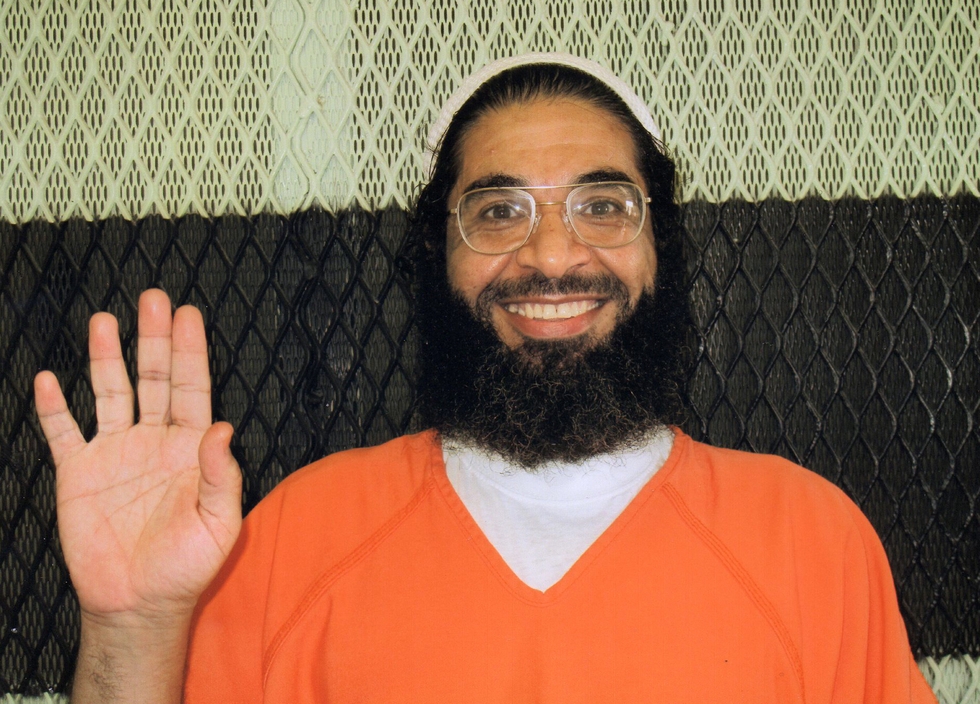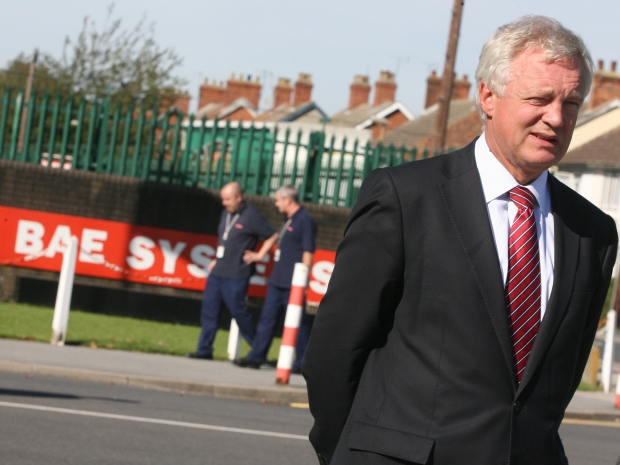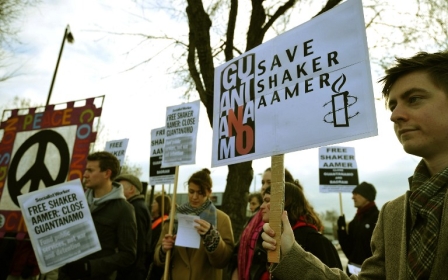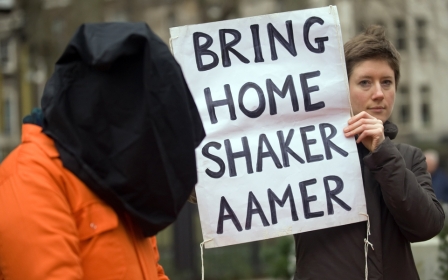Shaker Aamer's case represents skewed US-UK relationship, says Conservative MP

A senior UK politician will be taking part in a hunger strike to show support for the last British resident held at the US run Guantanamo Bay detention centre in Cuba.
Conservative MP David Davis told Middle East Eye in an interview Friday that he had been persuaded to join a solidarity 24-hour hunger strike this Sunday because of news that Shaker Aamer is on hunger strike himself, protesting against his continuing mistreatment at Guantanamo.
“Now that we are probably only two weeks away from his release I was very worried that he would harm himself just shy of coming home,” Davis said.
Campaigners this week said Aamer is concerned he may not survive until 25 October, when it is hoped he will be released back to the UK, where his British wife and four children live.
“The single most important thing in my mind is that we get Shaker back to his family in the UK and out of this hideous detention,” Davis said.
Shaker Aamer, 46, is the last British resident held by the US at Guantanamo Bay. The Saudi national was kidnapped by ransom hunters in Afghanistan in December 2001 and handed over to the Americans, who came to suspect him of being a recruiter and financier for al-Qaeda.
Aamer has never been charged or put on trial since his arrest, and denies involvement in terrorism. He says he was in Afghanistan working for an Islamic charity with his family. He has consistently accused the US of torturing him and claims to have witnessed the torture of other prisoners at the Bagram detention centre in Afghanistan and Guantanamo.
On 25 September, US President Barack Obama gave Congress 30 days notice that Aamer, after nearly 14 years in prison, will be released and returned to the UK, where he has a 13-year-old son he has never met.
Earlier this year Davis, an ex-government minister and former chair of the Conservative Party, went to Washington with a delegation of British MPs to lobby for Aamer’s release, which built on years of similar calls by the UK government.
Davis said that his trip was an insight into how the US government works, and how some officials view Washington’s alliance with London.
“My colleague [Conservative MP] Andrew Mitchell – who served on the national security council – was astonished by the cavalier attitude taken by some aspects of the American government to the relationship with the UK,” he said.
Davis explained that when he served as a government minister in the early 1990s the Americans had proved difficult to work with while negotiating a ban on nuclear weapons testing.
“The best word to describe the American government’s attitude to those negotiations was imperial: ‘This is our policy, you will all follow suit,’ he said. “We didn’t and in the end we forced them to change their policy. But it was like a colony trying to persuade the empire which way to go."
Aamer’s continued imprisonment despite UK protests has, Davies said, provided further evidence of an unbalanced relationship between the Brits and Americans.
“For a long time [the US-UK relationship] has been asymmetric. The comparative rewards out of the so-called special relationship are more to America than they are to us. [My visit] reinforced all my views about this asymmetry,” he said.
The September announcement that Aamer will be released imminently was not the result of any developments in his case – he was first cleared for release in 2007.
Over the past eight years Aamer has remained in prison while there has been a public debate about whether he poses a threat to US security.
For American senators, there has been an absence of political will to advocate for his release, principally because of a perceived risk that he may become involved in militancy.
“I don’t believe he is a threat and neither, I think, do the British authorities,” Davis said. “But in America this is a more sensitive issue and no senator wants to be in the position of having advocated for his release only to find him turn up in a conflict zone.”
Davis explained that behind the scenes in the US there is another aspect to Aamer’s case that may have kept him behind bars: Ibn Shaykh al-Libi.
Libyan national Libi gave key testimony to American investigators after being detained in Afghanistan around the same time as Aamer in 2001. He was the prisoner who linked Saddam Hussein’s Iraq to al-Qaeda and weapons of mass destruction, which led to one of the key justifications for the 2003 US invasion.
It has been widely reported, however, that Libi, who died in 2009, was brutally tortured by the Americans and that Aamer was witness to this while detained at Bagram.
“All of that will at one point be very embarrassing for the agencies involved,” Davis said. “And there are people – senior politicians and members of the agencies – who still believe that they did the right thing. And still believe that they should not be exposed.”
Aamer’s claim of having been a victim of torture, as well as being a witness to others’ mistreatment, may have played a role in why American authorities tried to have him deported to Saudi Arabia rather than to his preferred destination of the UK.
“I think the Americans were more comfortable with sending him to Saudi Arabia because they know he would be under very tight control there – he may be possibly detained or prosecuted” Davis said. “He certainly wouldn’t be able to air his views about Guantanamo, his treatment there, and, of course, his knowledge of the Libi case.”
“The primary difference between sending Shaker to Saudi Arabia, or sending him to Britain, is that in the UK he will be allowed to speak out.”
Davis said that he would be unsurprised if Aamer decides to launch a civil case against the UK government when he returns to London. British authorities are accused of being complicit in his alleged torture.
Although British involvement in the CIA torture program has not been reported as anything more than complicity, agents being present but not taking part in torture, there is still a chance there was more direct participation.
“We don’t think – but we don’t know for sure – that there was active [British] involvement [in the CIA torture program]. This may be something that Shaker Aamer will throw some light on when he comes back,” Davis said.
The Conservative MP explained that while he is confident British authorities have not played a role in Aamer’s extended detention, and have in fact worked hard to secure his release, there may be some officials who are less than keen to see Aamer back living in the UK.
“Whether there are a few people inside the agencies who don’t like it [Aamer’s UK return] because they were involved [in his mistreatment] – that’s another matter,” he said.
Davis sees Aamer’s case as part of a broader narrative in which the West has seen its ability to be a moral leader undermined. The global War on Terror has seen much criticism of the US and its supposed role as being the defender of the free world.
While Davis believes the US response to 9/11 was at least initially understandable – if morally wrong in his view – he said it is now beyond time for the West to live up to the democratic and human rights principles often espoused by political leaders.
“If you are claiming to hold the moral high ground you have to behave in a way that justifies it,” he said, warning that a failure to do this is “a gift to those who oppose you".
Davis explained that his argument has been backed up by those participating in the War on Terror, pointing to Charles Guthrie, a former UK army chief, who has said that “torture is not only illegal, unethical, ineffective, cruel and counter-productive, it is also plain dumb".
Redressing the ills of the post 9/11 era is of paramount importance, Davis said, because the Middle East and North Africa will be “the cockpit” of history for at least the next decade.
With war raging across the region, from the chaos of post-Gaddafi Libya to the brutal suffering in Syria’s civil war, and the rise of the Islamic State group in many nations, the key to an effective regional policy remains strikingly simple for Davis.
“Levels of comprehension – and therefore levels of rationality – about the Middle East in Western nations is limited, to put it mildly. I never thought that the George W Bush regime ever understood the Middle East at all. You might want to question their motives – I would first want to question their understanding. The same thing is true of many Western countries.
“We need to get back to understanding [the Middle East] before we can unite the people of the region who want to preserve our collective civilisation.”
New MEE newsletter: Jerusalem Dispatch
Sign up to get the latest insights and analysis on Israel-Palestine, alongside Turkey Unpacked and other MEE newsletters
Middle East Eye delivers independent and unrivalled coverage and analysis of the Middle East, North Africa and beyond. To learn more about republishing this content and the associated fees, please fill out this form. More about MEE can be found here.





